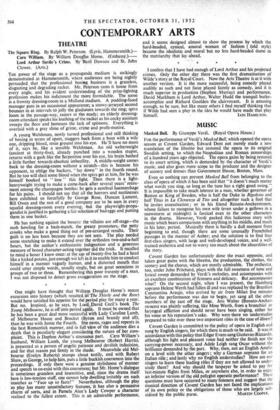CONTEMPORARY ARTS
THEATRE
Tim power of the stage as a propaganda medium is strikingly demonstrated at Hammersmith, where audiences are being nightly persuaded that the professional boxing business is a graceless, disgusting and degrading racket. Mr. Peterson rams it home from every angle, and his evident understanding of the prize-fighting profession makes his indictment the more formidable. The scene is a frowsty dressing-room in a Midland stadium. A pudding-faced manager puts in an occasional appearance; a snowy-jerseyed second bounces in at intervals to jolly the gladiators towards the ring; spivs loom in the passage-way, razors at the ready; an elderly dressing- room attendant speaks his loathing of the racket as his cocky assistant sweeps the floor and bemoans the lack of spitoons. Everything is overlaid with a grey slime of grime, crime and profit-motive.
A young Welshman, newly turned professional and still thinking of boxing in terms of sport, staggers back from a bout with a wily one, dripping blood, resin ground into his eye. He'll have no more of it, says he, like a sensible Welshman. An old welterweight (ancient at thirty-five), already punched into a wooden stupor, returns with a gash like the Serpentine over his eye, his brain bashed a littlefurther towards absolute imbecility. A middle-weight comes back to the dressing-room without a scratch—this is because his opponent, to oblige the backers, "lay down" in the fourth round. But he too will shed some blood when the spivs get at him, for he was himself booked to " lose " this fight. Then there is a light- heavyweight trying to make a come-back after several years' retire- ment among the champagne bottles: he gets a cerebral haemorrhage for his pains. I should not say that all the horrors and nastinesses here exhibited so forcefully by George Rose, Duncan Lamont, Bill Owen and the rest of a good company are to be seen in every squalid dressing-room every evening; -but the playwright-propa- gandist is justified in gathering a fair selection of bad eggs and putting them in one basket.
He has nothing against the boxers: the villains are off-stage—the mob howling for a bash-match, the greasy promoters,-the petty crooks who make a good thing out of pre-arranged results. Their guilt is no less keen because they are not seen. The play needed some stretching to make it extend over the orthodox two-and-a-half hours, but the author's enthusiastic indignation and a generous measure of broad character-acting together did the trick. It recalled to mind a boxer I knew once: at the age of twenty-five he had a head Lice a kicked potato, just enough wit left in it to enable him to conduct himself in a manner vaguely human, and a distorted mouth that could utter simple words, usually singly, but on great occasions in groups of two or three. Remembering this poor travesty of a man, I was not disposed to detect gross exaggeration on the stage.
•
One might have thought that William Douglas Home's recent excursion into history (which resulted iff-The Thistle and the Rose) would have satisfied his appetite for the period play for many a year. But no. Inspired, as he says, by Lord David Cecil's book The Young Melbourne, he is off into period again. It must be owned that he has been a great deal more successful with Lady Caroline Lamb, of Melbourne House and Brocket (Byron and brandy and all), than he was with Jamie the Fourth. She raves, rages and repents in the best Romantick manner, and in full view of the audience dies a death that is peculiarly elegant considering the nature of her com- plaint. This is Daphne Arthur's strenuous part. Caro William's husband, William Lamb, the young Melbourne (Robert Harris), is presented as a person of angelic patience and devilish indecision, and for that reason put firmly in the shade. Meanwhile old Mel- bourne (Evelyn Roberts) stumps about testily, and with Robert Shaw, as George, to help him, puts a little buckish coarseness into the proceedings, If only there were a genuine stylishness of manner and speech to co-exist with this coarseness; but Mr. Home's dialogue is sometimes graceless and insensitive, and, since the drama itself here is low-tension stuff, one cannot help dwelling irritably on such snatches as "Face up to facts!" Nevertheless, although the play as play has many unsatisfactory features, it has also a persuasive charm of sorts, and in Pamela Alan's Lady Cowper a character realised to the fullest extent. This is an admirable performance, and it seems designed almost to show the process by which the hard-headed, cynical, amoral woman of fashion j (old style) became the idealistic and moral but no less hard-headed dame in the matriarchy that lay ahead.
• • I confess that I have had enough of Lord Arthur and his projected crimes. Only the other day there was the first dramatisation of Wilde's story at the Royal Court. Now the Arts Theatre is at it with another version. It is the more successful, being comedy played audibly as such and not farce played faintly as comedy, and it is much superior in production (Stephen Murray) and performance. David Markham is Lord Arthur, Walter Hudd the tranquil butler- accomplice and Richard Goolden the clairvoyant. It is amusing enough, to be sure, but like many otheis I find myself thinking that if Wilde had seen a play in the idea he would have made that play


































 Previous page
Previous page